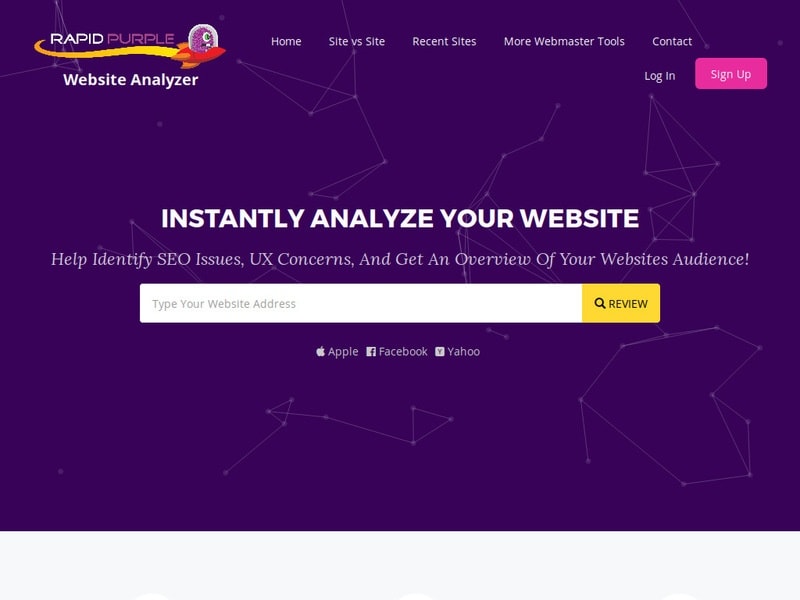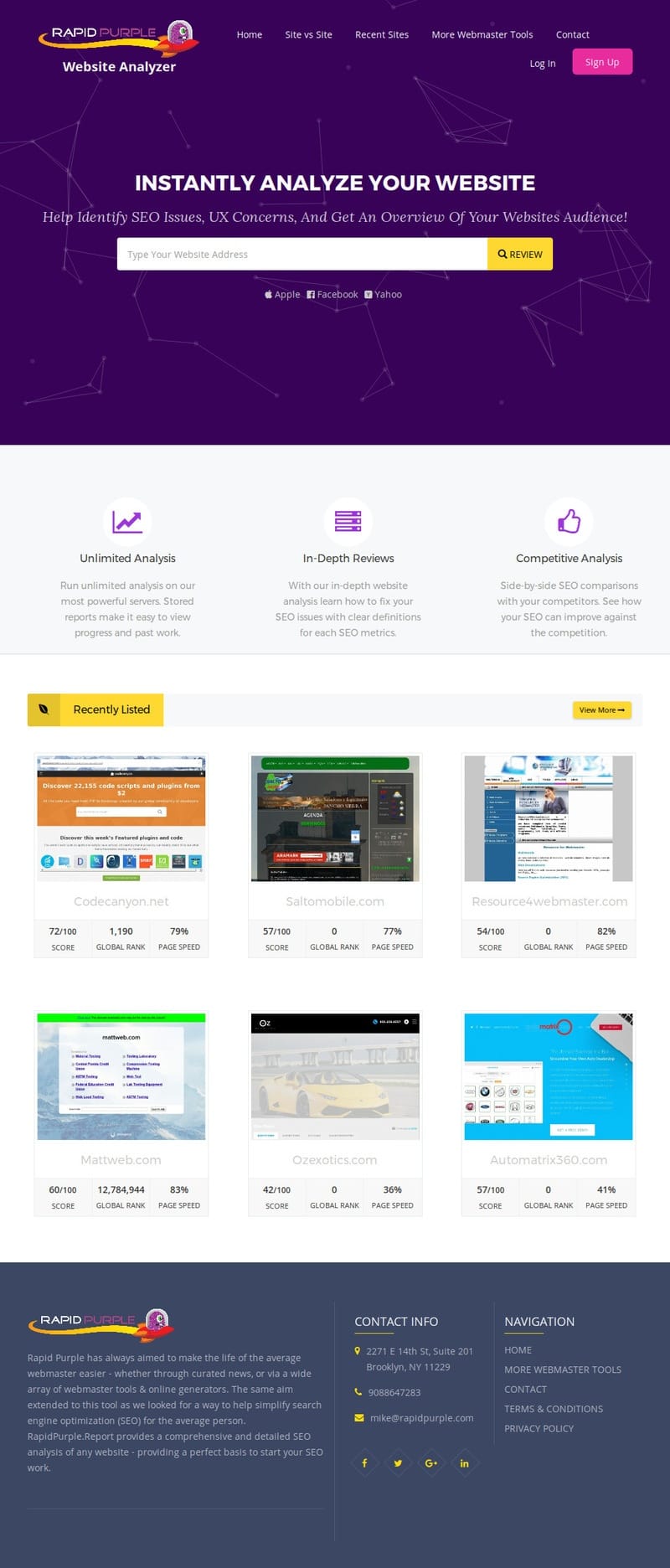Search Engine Optimization is one of the most important tasks that any business can undertake. Called SEO for short, optimization means making your website attractive for search engines. Search engines are designed with a very specific purpose: they want to find content that is relevant and beneficial to their users. Your goal then is to make your website, blog posts, and content in general attractive for search engines.
While designing my new SEO report tool, my goal was to make on-page SEO much easier for all webmasters. Often, I have to go over my client’s website manually to check various elements. However, doing so is time consuming, and honestly I’d rather spend my time working on higher value SEO strategy. By creating an automated tool to check for basic SEO elements, both my customers and I can focus on bigger things. And so, I would like to introduce everyone to the updated SEO report tool located at RapidPurple.Report which provides an in-depth analysis covering the following SEO elements:
[one_half]
- Meta Title
- Meta Description
- Meta Keywords
- Headings
- Google Preview
- Missing Image Alt Attribute
- Keywords Cloud
- Keyword Consistency
- Text/HTML Ratio
- GZIP Compression Test
- WWW / NON-WWW Resolve
- IP Canonicalization
- XML Sitemap
- Robots.txt
- URL Rewrite
- Underscores in the URLs
- Embedded Objects
- Iframe Check
- Domain Registration
- WHOIS Data
- Indexed Pages Count (Google)
- Backlinks Counter
- URL Count
- Favicon Test
- Custom 404 Page Test
- Page Size
- Website Load Time
[/one_half][one_half_last]
- PageSpeed Insights (Desktop)
- Language Check
- Domain Availability
- Typo Availability
- Email Privacy
- Safe Browsing
- Mobile Friendliness
- Mobile Preview Screenshot
- Mobile Compatibility
- PageSpeed Insights (Mobile)
- Server IP
- Server Location
- Hosting Service Provider
- Speed Tips
- Analytics
- W3C Validity
- Doc Type
- Encoding
- Facebook Likes Count
- PlusOne Count
- StumbleUpon Count
- LinkedIn Count
- Estimated Worth
- Alexa Global Rank
- Visitors Localization
- In-Page Links
- Broken Links
[/one_half_last]
While putting together the new SEO report tool, I came up with a few general SEO tips, and since you’re reading this article you probably care about SEO. As such I figured I would go ahead and share these SEO tips with you.
1. Think Like a Search Engine
A lot of amateurs try to “trick” search engines. Don’t waste your time. Even if you trick Google for a few days or even a few months, they will eventually catch onto and punish you. Instead, give search engines what they want: good content.
Generally speaking, search engines tend to favor longer content. Let’s say Google is examining a dozen “SEO audit tool” articles and wants to determine which one is best. One article is 350 words, another is 400, another is 600, and the last is 700. All things being equal, Google will generally chose the longer article.
2. Keywords are Good, but Don’t Stuff
While you’re writing up compelling SEO content, make sure you are using “key words.” These are search terms and words related to search terms that potential customers/readers might use when they conduct a search. By plugging in keywords, search engines will recognize what your content is about, and who it is relevant for.
Don’t make the mistake of “stuffing” keywords, or overusing them. 1 to 2 percent is usually enough for most SEO keywords. Sometimes, it is fine to go over or under that amount, but always make sure that is compelling and adds value to your readers. Don’t right content “just” for search engines.
3. Pay Attention to Images and Alt-Tags
Search engines can’t actually view images, not like we can anyways. Instead, search engines will read the “alt tags” and image file names to determine what the images are about. Make sure you fill out alt-tags and properly name image files (i.e. SearchEngineTool.png, rather than yadablop.png).
Also, make your content image and media rich! Videos and images add value to readers, which means that search engines love them. Just make sure any non-written media you post up has the proper tags and file names so search engines can examine them.
4. Fast and Mobile Responsive Websites are a Must
Search engines take user experience very seriously. Right now, we live in the era of the smartphone. Increasingly, more people are using smartphones rather than desktop and laptop computers. Using a website that has not been optimized for a smartphone can be very difficult. As such, search engines greatly favor smartphone optimized websites.
If your website is not optimized for mobile use, that’s a big deal. Not only will search engines punish you, but customers will quickly log off.
Conclusion: Audit, Strategies, Repeat
There is a lot more that goes into search engine optimization. I have put together an SEO checklist you can easily follow when generating content for your website. Furthermore I have some great tips on how you can combine your SEO strategy with your inbound content to make one, super-powerful, SEO campaign. Check that out here. Not only should you have a keyword strategy, but you should also have an entire content strategy. SEO should be part and parcel of every image, feature, blog, and piece of content on your website. And that’s just on-page SEO. A lot more goes into backlinking and other “off page” SEO efforts.
Make sure you check out my SEO report and auditing tool so you can identify gaps! This tool will help you discover what you need to improve on. You can also research competitor websites to see where they are lacking and excelling.
SEO is an always ongoing effort! It’s something you have to pay attention every day. However, once you get the basics down, and a strategy in place, many of your SEO efforts will come naturally.

